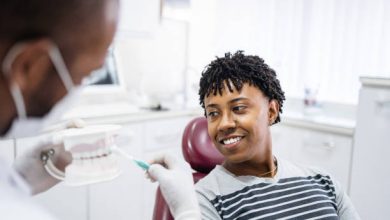10 Ways Black Women Can Sleep Better with Hot Flashes


When going through the trying years of transitioning into menopause, life doesn’t stop piling on changes in our lives as women. You could be taking care of aging parents, supporting your kids as they shift into adulthood, accepting more responsibilities at your workplace, or reflecting on the path of your own life and where it’s headed.
Imagine dealing with all of that with the cherry on top of menopause symptoms. It’s no wonder you struggle with catching some Z’s.
Hot flashes, night sweats, and drastic adjustments in mood — depression specifically— can play a significant role in your poor sleep schedule. Here are 10 tips that may help you kill two birds with one stone: coping with symptoms while getting proper sleep.
How Black Women Experience Menopause and Midlife Aging Compared to Caucasian Women
Based on a study posted in February 2022, which looked deeply into Black and white women who partook in the Study of Women’s Health Across the Nation (SWAN), Black women have significantly more intense and recurring “vasomotor symptoms,” such as hot flashes and night sweats, as opposed to white women.
Getting into the nitty-gritty details, the study discovered that Black women in particular were:
- 50 percent more prone than white women to experience symptoms including hot flashes and night sweats
- More likely to suffer from frequent and irritating hot flashes than white women
- More likely to experience hot flashes and night sweats for an average of 10 years. Meanwhile, Caucasian females experienced them for an average of 6.5 years.
The reason these observations are significant is because vasomotor symptoms are not solely irritating. Night sweats can throw off your entire sleep cycle — and as documented in the study, Black women mentioned a decline in quality of sleep in comparison to white women — and research has proven that constant hot flashes are linked to a greater likelihood of cardiovascular disease.
RELATED: Revitalize Your Energy: Beat Menopausal Fatigue with These 8 Tips!
How to Catch Some Z’s Throughout the Menopausal Transition
Certain women who have a hard time sleeping go for the route of over-the-counter sleeping remedies like melatonin. Others use prescription medications to help them sleep, which can help when used for a brief period. However, it is worth mentioning that these are not a cure for sleep interruptions, (i.e. insomnia), and should not be used in the long term.
Not getting sufficient sleep can impact many aspects of our lives. For instance, lack of sleep can make you feel annoyed or depressed, which could make you more forgetful than usual, and could result in you getting into more falls or accidents. Additionally, research now has suggested that waking up from sleep itself may provoke hot flashes, instead of it being vice versa.
Implementing healthier habits as you prepare to hit the hay can help you get a proper night of rest and sleep.
To make the quality of your sleep better through this menopausal transition and afterward, BlackDoctor.Org recommends the following 10 tips:
- Try to abide by a consistent sleep schedule. Make it a goal to knock out and wake up at the exact time every day.
- As tempting as it is, try to avoid taking any sort of naps in the late afternoon or evening if you can. Napping could throw you off and keep you once the night sets in.
- Come up with a nightly routine that brings you comfort. This can look like reading a book, tuning in to relaxing music, or soaking in a warm bath.
- Try to limit your screen time; whether it is your laptop, smartphone, or TV. The light from all of these devices can give you a hard time falling asleep.
- Maintain a temperature that makes you comfortable in your bedroom, not too hot or cold, and without too much noise.
- Work out at normal times daily, just as long as it’s not cutting it close to when you typically go to bed.
- Avoid consuming heavy meals around the time you want to get a decent shut-eye.
- Steer clear from any sort of caffeine (coffee, tea, and chocolate) when it’s later in the day.
- Don’t drink alcohol. The smallest amounts can make it more of a struggle to stay asleep.
- Consider Cognitive Behavioral Therapy for Insomnia. This problem-solving method of therapy has been proven to help enhance sleep in women with menopausal symptoms.
RELATED: 4 Natural Remedies for Hot Flashes
Cognitive behavioral therapy can be found through a class or in intimate one-on-one sessions. Make sure your therapy is done with a trained professional who’s experienced in working with women in their menopausal transition. Your doctor may be able to suggest a therapist in your local region.
If switching up your bedtime routine with these tips doesn’t help as much as you had hoped, you may want to speak with your doctor and find out what may specifically work best for you to get a good night’s sleep so you can age gracefully and peacefully.




